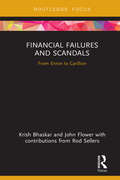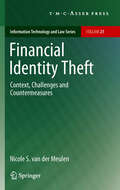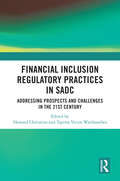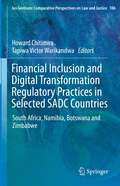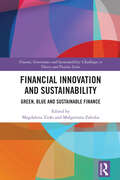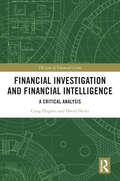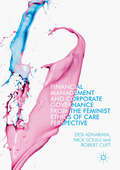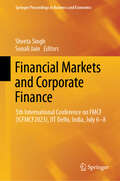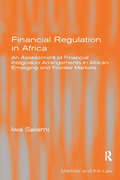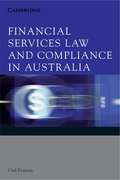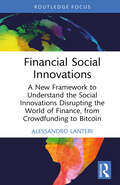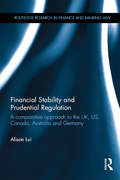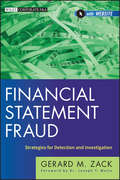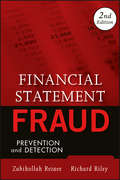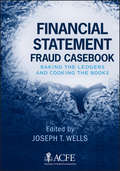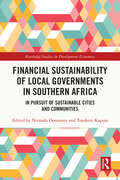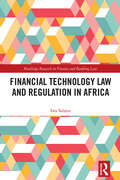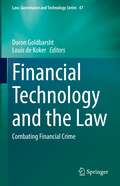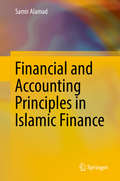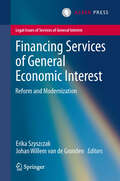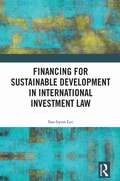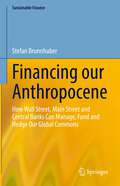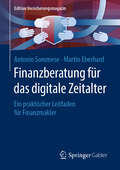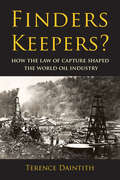- Table View
- List View
Financial Failures and Scandals: From Enron to Carillion (Disruptions in Financial Reporting and Auditing)
by John Flower Krish BhaskarThis concise volume evaluates the cause and significance of recent corporate failures and financial scandals, and how they reflect on the fitness for purpose of the external auditors, financial reports, financial watchdogs, boards, directors and senior management. Failures like the disastrous collapse of Carillion, examined at length, have ultimately led to a crisis of confidence not only in the audit process but in the entire process of financial reporting. Revealing the shortcomings in audit quality, independence, choice and the growing expectation gap, Financial Failures and Scandals questions if the profession, its regulators or government watchdogs, are adequately prepared for the challenges of increasing regulation, public outcry and political scrutiny in the face of inevitable future financial failures. The fundamental structures of financial reporting, annual reports, boards of directors and senior management are often found to have failed. Tighter regulation and new requirements for reporting will inevitably result. Drawing on extensive research and interviews with insiders, users and experts, this unique book provides a compelling account of the profoundly disruptive impact of financial failures on corporate and financial accountability. Topical and readable, this book will be of great interest to students, researchers and professionals in accounting and auditing, as well as to policy makers and regulators.
Financial Identity Theft
by Nicole S. van der MeulenThe existence of financial identity theft in the United States, and its (gradual) spread to other areas of the world, increases the need to understand how identity theft occurs and how perpetrators of the crime manage to take advantage of developments within contemporary society. This book aims to provide such an understanding through an in-depth comparative analysis which illustrates how states, financial service providers, consumers, and others facilitate the occurrence of financial identity theft in the United States and the Netherlands.
Financial Inclusion Regulatory Practices in SADC: Addressing Prospects and Challenges in the 21st Century (Routledge Studies on Law in Africa)
by Howard Chitimira and Tapiwa Victor WarikandwaAgainst a background of calls to prioritise the improvement of financial inclusion in Africa, this book provides an analysis of current financial inclusion measures in Southern Africa. Evaluating the existing strengths and weaknesses of financial inclusion in Africa, it identifies opportunities to improve inclusive financial services and aid poverty reduction in the region. With a focus on South Africa, Namibia, Botswana, and Zimbabwe as case studies for assessing current financial inclusion in the context of particular challenges faced by unbanked and underbanked customers, who are easy targets for cybercriminals due to low levels of digital literacy, it looks into the regulation and promotion of financial inclusion in Southern Africa. The book explores financial inclusion in the context of digital transformation in the 21st century, examining the regulation and promotion of financial inclusion in the context of digital transformation, as well as the challenges related to financial inclusion. Suggesting improvements to aspects of company law, securities and financial markets in the Southern African Development Community region, the book offers a comprehensive study on the regulation and promotion of financial inclusion in the Southern African Development Community region. It will be essential reading for students and academics researching financial inclusion, international economic law and development.
Financial Inclusion and Digital Transformation Regulatory Practices in Selected SADC Countries: South Africa, Namibia, Botswana and Zimbabwe (Ius Gentium: Comparative Perspectives on Law and Justice #106)
by Howard Chitimira Tapiwa Victor WarikandwaThis book investigates the regulation and promotion of financial inclusion and provides a comparative analysis of the regulation, promotion and enforcement of the relevant laws in the SADC (in particular, South Africa, Namibia, Botswana and Zimbabwe), as well as the challenges of financial inclusion. In turn, it evaluates financial inclusion in the context of specific challenges faced by unbanked and underbanked customers, who are easy targets for cyber criminals because they tend to have lower levels of digital literacy. The book presents novel discussions that identify the challenges and flaws associated with the enforcement of financial inclusion laws and related measures intended to promote financial inclusion in the SADC region. This is primarily done in order to reveal the current strengths and weaknesses of financial inclusion laws in relation to certain aspects of the companies, securities and financial markets in the region. For example, there is no common financial inclusion instrument/law that is effectively and uniformly applied throughout the SADC. This has impeded the enforcement authorities’ efforts to effectively combat financial exclusion across the region.The book is likely the most comprehensive study to date on the regulation and promotion of financial inclusion in the SADC region and fills a major gap in SADC and African legal jurisprudence. As such, it offers a valuable asset for policymakers, attorneys, bankers, securities (share) holders, and other market participants who deal with financial inclusion, as well as undergraduate and graduate students interested in the topic.
Financial Innovation and Sustainability: Green, Blue and Sustainable Finance (Finance, Governance and Sustainability)
by Magdalena Zioło Małgorzata ZaleskaIn recent years, factors such as sustainability, digitalization, climate change, energy transformation, social inclusion, gender parity, and Environmental, Social and Governance (ESG) risk have been playing an increasingly important role in the process of financial transformation. The effect of the impact is increased regulation and guidance for financial markets, in relation to adapting current activities to meet the new challenges, for example: The process of greening finance and spreading the blue wave in finance Building sustainable value in the business models of financial institutions Creating an offer of sustainable financial products Ensuring parity between women and men in the decision-making bodies of financial institutions Sustainable ratings Climate stress tests This book focuses on the intersection between nature and finance and offers a comprehensive overview of the trends, transformations and challenges in finance and the financial markets related to the effects of sustainability concepts or ESG factors. The book has been designed to show these trends, through the evolving subdisciplines of finance, such as green and blue finance. It presents critical recommendations for the ecosystem and network of finance in the era of ESG and sustainability and paints a comprehensive picture of contemporary finance, identifying the factors determining its sustainable transformation.This is one of the first books to present the issues of sustainability and ESG risk in finance through the prism of individual types of finance. Not only will the book appeal to scholars and researchers in the field of banking, economics, finance and accounting, but it will also find an audience among policymakers and practitioners involved in the finance and sustainability discourse.
Financial Investigation and Financial Intelligence: A Critical Analysis (The Law of Financial Crime)
by Craig Hughes David HicksThis book critically analyses the conceptual understanding of financial investigation and financial intelligence among UK law enforcement authorities and their commentators. The work provides a critical review of financial investigation, including international standards, and how it is perceived and applied by law enforcement agencies. It adopts the position that financial investigation is an evidence-gathering process and not simply related to asset recovery. Here, the concept of “following the money” is superseded by the wider approach of “following the financial footprint” by generalist and specialist investigators and analysts. The book focuses on identifying the financial footprint as a skill set for routine investigation application inclusive of the emerging threat posed by the digital environment, including cryptocurrencies. It assesses the terminology, typologies and structures associated with the subject area at the national and international levels. It also examines the historical trajectory of financial investigation to understand current perceptions of it within law enforcement, among government ministers and policy makers. The book will be of interest to students, academics and policy makers internationally working in the areas of criminal law, criminology and finance.
Financial Management and Corporate Governance from the Feminist Ethics of Care Perspective
by Desi Adhariani Nick Sciulli Robert CliftThis book investigates how businesses can adapt their executive and fiscal practices to adopt an ethical, equal-opportunity approach. The authors demonstrate how corporations can create sustainable work environments that embrace feminist care ethics and ground their research in a strong theoretical discussion of this relatively new framework. The discussion has a multidisciplinary outlook and explores how the concept of care ethics might be successfully applied to various professional contexts. Later chapters present findings from an empirical case study conducted in Australia and use both qualitative and quantitative methods to analyse the potential power of a feminist care of ethics approach within commercial and corporate management.
Financial Management and Corporate Governance from the Feminist Ethics of Care Perspective
by Desi Adhariani Nick Sciulli Robert CliftThis book investigates how businesses can adapt their executive and fiscal practices to adopt an ethical, equal-opportunity approach. The authors demonstrate how corporations can create sustainable work environments that embrace feminist care ethics and ground their research in a strong theoretical discussion of this relatively new framework. The discussion has a multidisciplinary outlook and explores how the concept of care ethics might be successfully applied to various professional contexts. Later chapters present findings from an empirical case study conducted in Australia and use both qualitative and quantitative methods to analyse the potential power of a feminist care of ethics approach within commercial and corporate management.
Financial Markets and Corporate Finance: 5th International Conference on FMCF (ICFMCF2023), IIT Delhi, India, July 6-8 (Springer Proceedings in Business and Economics)
by Shveta Singh Sonali JainThis book presents a selection of the best papers from the 5th International Conference on Financial Markets and Corporate Finance (ICFMCF2023), held in the Department of Management Studies, IIT Delhi, in July 2023. In today's dynamic and swiftly changing financial environment, marked by heightened volatility and complexity, ensuring the financial sector's resilience is paramount. The contents of this book address this gap by offering state-of-the-art research in the fields of financial institutions, financial markets, and corporate finance. The book specifically explores dynamic topics such as risk management in banks, the growth of fintech, cryptocurrencies, the proliferating usage of derivative instruments, CSR policies, and the effect of corporate governance and earnings management on firm performance, with a special emphasis on emerging economies. The studies utilize advanced and innovative qualitative and quantitative techniques to offer valuable insights into finance. The studies included in this book deliberate on theoretical work, empirical findings, and policy implications related to financial markets and corporate finance. Given the scope, the range of papers in this collection benefits academics, practitioners, industry experts, and policymakers seeking economic insights to address various challenges.
Financial Regulation in Africa: An Assessment of Financial Integration Arrangements in African Emerging and Frontier Markets (Markets And The Law Ser.)
by Iwa SalamiIn the wake of the global financial crisis, there has been a worldwide search for alternative investment opportunities, away from advanced markets. The African continent is now one of the fastest-growing economic regions in the world and represents a viable destination for foreign direct and portfolio investment. This book, which is the first comprehensive analysis of financial integration and regulation in Africa, fills a huge gap in the literature on financial regulation and would constitute an invaluable source of information to policy makers, investors, researchers and students of financial regulation from an emerging and frontier markets perspective. It considers how financial integration can facilitate African financial markets to achieve their full potential and provides a comparative study with the EU framework for financial integration and regulation. It assesses the implementation of effective and regional domestic infrastructures and how these can be adapted to suit the African context. The book also provides an assessment of government policies towards the integration of financial regulation in keeping with the regional agenda of the African Union (AU) and the African Economic Community (AEC).
Financial Services Law and Compliance in Australia
by Gail PearsonUp until the global credit crisis in 2008, 'Financial Services' was the fastest growing sector of the Australian economy. This growth has had profound implications for individuals, corporations and government. Following extensive review in the last part of the twentieth century, Australia put in place an overarching system for regulating all financial services, replacing a system that was based on separate regulation of products in individual industries. Focusing on the implications of the new system for retail clients - 'financial citizens' - Financial Services Law and Compliance in Australia provides a comprehensive account of the regulatory structure and a detailed analysis of the legislative framework, including discussion of the new regulatory bodies, the new licensing requirements for those wishing to enter the financial services market and the new obligations for those marketing or offering financial services to the public. This is an essential resource for those working in, and advising on, financial services, for students of financial services law, and for anyone needing to understand this new regime in Australia.
Financial Social Innovations: A New Framework to Understand the Social Innovations Disrupting the World of Finance, from Crowdfunding to Bitcoin
by Alessandro LanteriThis book helps make sense of the emerging and established social innovations that have disrupted and are disrupting the world of finance.Written in an engaging style, this book offers a systematic study of social innovation in the financial services. It introduces the fundamental concepts of financial social innovations (FINSIs), places them in the context of the broader literature, and provides a new framework for understanding and organising these innovations. The book applies the framework to seven existing FINSIs to illustrate their important components and explore their benefits as well as the more negative or harmful aspects to society. These seven FINSIs are microfinance, peer-to-peer (P2P) lending, crowdfunding, mobile banking, impact investing, digital cryptocurrencies, and social impact bonds. The easy-to-follow framework will help to ground the reader’s understanding of FINSIs as the existing ones evolve and new ones are developed.This book is ideal for courses on social innovation, social entrepreneurship, and financial innovation in departments of business, economics, social sciences, and political science.
Financial Stability and Prudential Regulation: A Comparative Approach to the UK, US, Canada, Australia and Germany (Routledge Research in Finance and Banking Law)
by Alison LuiFinancial stability is one of the key tenets of a central bank’s functions. Since the financial crisis of 2007-2009, an area of hot debate is the extent to which the central bank should be involved with prudential regulation. This book examines the macro and micro-prudential regulatory frameworks and systems of the United Kingdom, Australia, the United States, Canada and Germany. Drawing on the regulator frameworks of these regions, this book examines the central banks’ roles of crisis management, resolution and prudential regulation. Alison Lui compares the institutional structure of the new ‘twin-peaks’ model in the UK to the Australian model, and the multi-regulatory US model and the single regulatory Canadian model. The book also discusses the extent the central bank in these countries, as well as the ECB, are involved with financial stability, and argues that the institutional architecture and geographical closeness of the Bank of England and Financial Policy Committee give rise to the fear that the UK central bank may become another single super-regulator, which may provide the Bank of England with too much power. As a multi-regional, comparative study on the importance and effectiveness of prudential regulation, this book will be of great use and interest to students and researchers in finance and bank law, economics and banking.
Financial Statement Fraud
by Gerard M. ZackValuable guidance for staying one step ahead of financial statement fraudFinancial statement fraud is one of the most costly types of fraud and can have a direct financial impact on businesses and individuals, as well as harm investor confidence in the markets. While publications exist on financial statement fraud and roles and responsibilities within companies, there is a need for a practical guide on the different schemes that are used and detection guidance for these schemes. Financial Statement Fraud: Strategies for Detection and Investigation fills that need.Describes every major and emerging type of financial statement fraud, using real-life cases to illustrate the schemesExplains the underlying accounting principles, citing both U.S. GAAP and IFRS that are violated when fraud is perpetratedProvides numerous ratios, red flags, and other techniques useful in detecting financial statement fraud schemesAccompanying website provides full-text copies of documents filed in connection with the cases that are cited as examples in the book, allowing the reader to explore details of each case furtherStraightforward and insightful, Financial Statement Fraud provides comprehensive coverage on the different ways financial statement fraud is perpetrated, including those that capitalize on the most recent accounting standards developments, such as fair value issues.
Financial Statement Fraud
by Richard Riley Zabihollah RezaeePractical examples, sample reports, best practices and recommendations to help you deter, detect, and prevent financial statement fraudFinancial statement fraud (FSF) continues to be a major challenge for organizations worldwide. Financial Statement Fraud: Prevention and Detection, Second Edition is a superior reference providing you with an up-to-date understanding of financial statement fraud, including its deterrence, prevention, and early detection.You will findA clear description of roles and responsibilities of all those involved in corporate governance and the financial reporting process to improve the quality, reliability and transparency of financial information.Sample reports, examples, and documents that promote a real-world understanding of incentives, opportunities, and rationalizationsEmerging corporate governance reforms in the post-SOX era, including provisions of the SOX Act, global regulations and best practices, ethical considerations, and corporate governance principlesPractical examples and real-world "how did this happen" discussions that provide valuable insight for corporate directors and executives, auditors, managers, supervisory personnel and other professionals saddled with anti-fraud responsibilitiesExpert advice from the author of Corporate Governance and Ethics and coauthor of the forthcoming Wiley textbook, White Collar Crime, Fraud Examination and Financial ForensicsFinancial Statement Fraud, Second Edition contains recommendations from the SEC Advisory Committee to reduce the complexity of the financial reporting process and improving the quality of financial reports.
Financial Statement Fraud Casebook: Baking the Ledgers and Cooking the Books
by Joseph T. WellsA comprehensive look at financial statement fraud from the experts who actually investigated them. This collection of revealing case studies sheds clear insights into the dark corners of financial statement fraud. Includes cases submitted by fraud examiners across industries and throughout the world Fascinating cases hand-picked and edited by Joseph T. Wells, the founder and Chairman of the world's leading anti-fraud organization ? the Association of Certified Fraud Examiners (ACFE) ? and author of Corporate Fraud Handbook Outlines how each fraud was engineered, how it was investigated and how the perpetrators were brought to justice Providing an insider's look at fraud, Financial Statement Fraud Casebook illuminates the combination of timing, teamwork and vision necessary to understand financial statement fraud and prevent it from happening in the first place.
Financial Sustainability of Local Governments in Southern Africa: In Pursuit of Sustainable Cities and Communities (Routledge Studies in Development Economics)
by Nirmala Dorasamy Tonderai KapesaThis book delves into the critical issue of ensuring the long-term financial viability of local governments in the diverse region of Southern Africa. Across Southern Africa, cities and communities are facing a multitude of challenges, from rapid urbanization and infrastructure challenges to social inequality and environmental degradation. In this thought-provoking book, the authors explore the intricate relationship between financial sustainability and the pursuit of sustainable cities and communities through different lenses.Drawing on extensive research and case studies from various countries in the region, this book provides a comprehensive analysis of the financial realities faced by local governments. It examines the factors influencing revenue generation, expenditure management, and fiscal governance, shedding light on the complexities of financial decision-making in the context of limited resources and pressing development needs. Furthermore, it offers practical insights and actionable recommendations for policymakers, practitioners, and academics. It explores innovative approaches to revenue diversification, efficient expenditure allocation, and effective fiscal management, with the ultimate aim of fostering sustainable development, social services delivery, and environmentally sustainable infrastructure in Southern African cities and communities.This is an essential resource for anyone interested in understanding the challenges and opportunities associated with financial sustainability in the context of urbanisation and sustainable development in greater Africa. It serves as a guide and inspiration for building financially resilient local governments that can support the aspirations and well-being of their citizens while contributing to the broader vision of sustainable cities and communities.
Financial Technology Law and Regulation in Africa (Routledge Research in Finance and Banking Law)
by Iwa SalamiThis book comprehensively analyses financial technology law and regulation in Africa and provides domestic and regional perspectives on regulating FinTech in Africa. It studies policy considerations that can assist African policymakers in facilitating a balanced regulatory approach that does not stifle financial innovation.The growth of financial technology in Africa presents huge opportunities for inclusive growth on the African continent. Digital finance, which sits at the heart of financial technology, could be key to placing Africa back on the economic recovery trajectory after the COVID-19 crisis, facilitating its speed in achieving the UNSDG 2030 goals and setting the continent on course to meet its African Union Agenda 2063. This book:- Examines mobile financial services, crowdfunding, crypto-assets, digital currencies including central bank digital currencies, decentralised finance and open banking and finance, all from an African perspective;- Explores the status of regulation in these areas in Africa, highlighting areas where regulation is lacking, inadequate and in need of reform;- Highlights pragmatic approaches to regulation such as including the adoption of regulatory sandboxes and regulatory technology and discusses requirements for the adoption of supervisory technology in Africa;- Scrutinises the implications of developments in the FinTech space in Africa for international security and economic and financial stability.Placing Africa in the global context, the book argues for an international effort to understand the global dimensions of FinTech developments so that robust and applicable global regulatory frameworks can be applied in developing parts of the world. It will provide useful insights to investors, policy makers and entrepreneurs. It will also be essential reading for students and researchers in the field of technology, public policy, regulatory policy, financial policy, banking, and finance law.
Financial Technology and the Law: Combating Financial Crime (Law, Governance and Technology Series #47)
by Doron Goldbarsht Louis De KokerBlockchains and cryptocurrencies, open banking, virtual assets, and artificial intelligence have become the buzzword of this decade. This book focuses on these ‘disruptive’ financial technologies that provide alternatives to the traditional financial services typically offered by regulated financial institutions. Financial technologies are characterized by the innovative ways in which they initiate, support or extend traditional financial services or offer alternative financial pathways and products. However, these financial technologies also pose money laundering and terrorist and proliferation financing as well as cyber security risks that require mitigation. This edited volume addresses a range of regulatory and enforcement challenges related to financial technology and financial crime. The book responds to the United Nations’ Sustainable Development Goals, in particular in relation to economic development, employment, national security, law enforcement and social well-being. Fostering responsible financial innovation promotes long-term economic growth, inclusion, and improved living standards. This book explores how to promote financial innovation while mitigating risks in a way that ensures financial prosperity and social inclusion.
Financial and Accounting Principles in Islamic Finance
by Samir AlamadThis book provides an original account detailing the origins and components of a faith-based accounting system that was founded around 629 CE. By examining the historical development that the accounting systems underwent within the context of faith-based rules and values, the book explains what is meant by the term “faith-based accounting”, together with a discussion of its characteristics in relation to various product structures and the underlying Islamic finance principles. It provides important theoretical and practical contributions by explaining accounting as a value-based science rather than a value-free object or abstract. This book explores the way in which religious rules act as a directive for accounting and auditing practices in IFIs. Through which the concept of money and digital currency within the theory of money and how it is enacted in a faith-based context, amid differences of opinions among its actors, is examined. This is an important foundation to explain Islamic accounting and includes how this outcome would shape the faith-based view regarding the new phenomenon of digital currency (DC). Also featured is the concept of paper money within the theory of money and how it is enacted in a faith-based legal framework by identifying two core concepts of today’s Fiat money as being a single genus or multi-genera money. This book is not merely an academic work, nor is it a pure practitioner guide; rather, it is a robust work that combines both. It marries rigorous academic research and theories with practical industry experiences. The book provides a clear and concise guide to accounting in Islamic economics and finance and how Islamic financial institutions could meet the applicable faith-based rules in their accounting practices.
Financing Services of General Economic Interest
by Erika Szyszczak Johan Willem GrondenThis book examines the legacy of the 2003 ruling of the Court of Justice of the European Union in Altmark. This case changed the direction of how Services of General and Economic Interest (SGEI) should be funded in the EU against a background of liberalisation, and the need for efficiency and global competitiveness. The book examines the European Commission's response to the Altmark ruling in the measures known as the 'Altmark-Monti-Kroes Package' and charts the review of this package from 2009 culminating in a new package of measures, known as the 'Almunia Package'. The seemingly technocratic idea of a review of the 'Altmark-Monti-Kroes Package' could not have anticipated the demanding and changed economic and constitutional context of the EU in 2009. It is in this light that the authors in this book explore in great detail the different components of the new 'Almunia Package' of measures introduced in 2011-2012, offering a critical review and highlighting where the future direction of the regulation of SGEI may lead as the EU struggles in an economic climate of austerity to balance a new constitutional dimension of a 'highly competitive social market economy' with a modernisation agenda for the single market.
Financing for Sustainable Development in International Investment Law
by Soo-hyun LeeThis book highlights the intersection between international investment law and sustainable development, particularly in the context of the right to regulate for public interest related to sustainable development.Addressing key challenges hindering the harmony between investment law and sustainable development, the book unveils a new methodology to assess whether a government measure or foreign investment contributes to sustainable development. The primary question driving this text is: how should investment treaty arbitration tribunals evaluate the sustainable development impact of both government measures and foreign investments affected by those measures? Beginning by establishing a conceptual framework around the right to regulate for public interest, the book also identifies limitations in the typical approach taken in investment treaty arbitration. Additionally, broader systemic constraints within international investment law concerning sustainable development are discussed.This book will be of interest to students and scholars in the field of international investment law, economic law, and sustainable development.
Financing our Anthropocene: How Wall Street, Main Street and Central Banks Can Manage, Fund and Hedge Our Global Commons (Sustainable Finance)
by Stefan BrunnhuberDevelopment needs to meet the UN SDG have primarily been financed through private sector financing, conventional public sector funding and philanthropic commitment. These sources are not sufficient in scale and speed to meet the pressing finance needs. The world community is too busy repairing, stabilizing, and refunding the system to maintain the stability of the existing system. The introduction of a parallel electronic currency specifically designed to finance global commons, and a human-centred economy would provide the necessary resources to achieve the UN SDGs while stabilizing the existing monetary system.This book analyses how the development of cryptocurrencies based on blockchain distributed ledger technologies has prompted leading central banks around the world to study the potential application of this approach to directly inject purchasing power without dependence on the banking system. Furthermore, the book illustrates how this approach can be utilized to finance the huge multi-trillion dollar annual investment requirements for achieving the Sustainable Development Goals (SDG).With a Foreword from the President of the Club of Rome.“This book is where fiction turns into fact.” - World Bestselling Author of ‚The Minister of the Future‘ Stan Robinson“…challenging, innovative and interdisciplinary… to address the world’s problems.” - Founder and Father of the Quantitative Easing (QE), Prof. Dr. Richard Werner, Oxford University, GB“The real tragedy of the commons, as this book shows, is that we have allowed the most valuable social resources, our money and legal systems, to be employed for private gain instead of mobilizing them for social goals, not the least to ensure the survival of the human species on this planet.” - Best-selling author of ‚The code of capital’ Katharina Pistor, Edwin B. Parker Professor of Comparative Law and Director, Center on Global Legal Transformation Columbia Law School, USA
Finanzberatung für das digitale Zeitalter: Ein praktischer Leitfaden für Finanzmakler (Edition Versicherungsmagazin)
by Antonio Sommese Martin EberhardIn diesem Buch zeigen zwei Experten, wie Berater erfolgreich Finanzdienstleistungsunternehmen aufbauen und positionieren. Existenzgründer erhalten wertvolle Hilfestellung zu allen Aspekten, die zu einer guten strategischen Planung und einer erfolgreichen Unternehmensführung gehören. Neben den aktuellen Entwicklung der Finanz- und Versicherungsberatung zeigen die Autoren auch die zukünftigen Entwicklungen des Marketings auf. Der Einsatz moderner technischer Hilfsmittel sowie auch etablierter Vertriebsansätze werden aufgezeigt und bewertet. Einen Schwerpunkt der Darstellung ist die Identifizierung und Bindung passender Zielgruppen.
Finders Keepers?: How the Law of Capture Shaped the World Oil Industry
by Terence DaintithSince the beginnings of the oil industry, production activity has been governed by the 'law of capture,' dictating that one owns the oil recovered from one's property even if it has migrated from under neighboring land. This 'finders keepers' principle has been excoriated by foreign critics as a 'law of the jungle' and identified by American commentators as the root cause of the enormous waste of oil and gas resulting from US production methods in the first half of the twentieth century. Yet while in almost every other country the law of capture is today of marginal significance, it continues in full vigour in the United States, with potentially wasteful results. In this richly documented account, Terence Daintith adopts a historical and comparative perspective to show how legal rules, technical knowledge (or the lack of it) and political ideas combined to shape attitudes and behavior in the business of oil production, leading to the original adoption of the law of capture, its consolidation in the United States, and its marginalization elsewhere.
